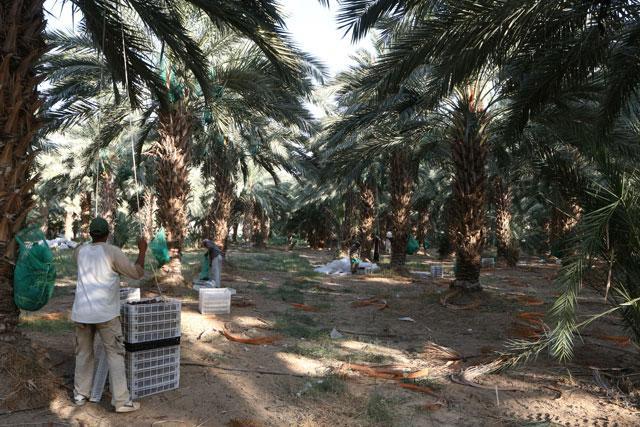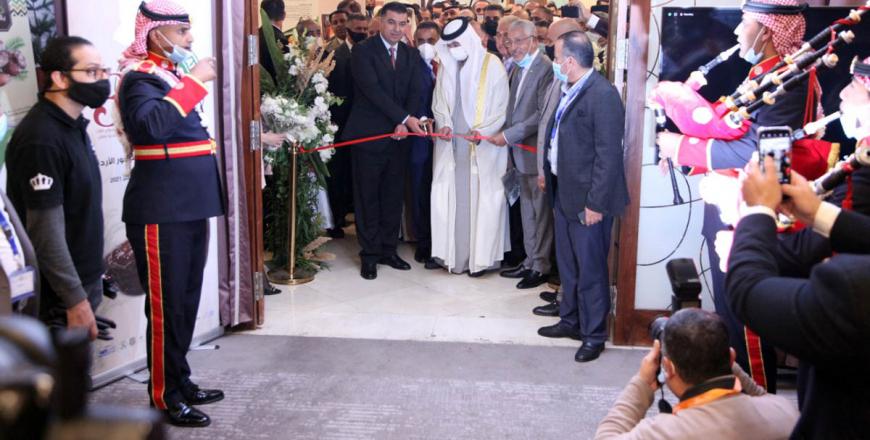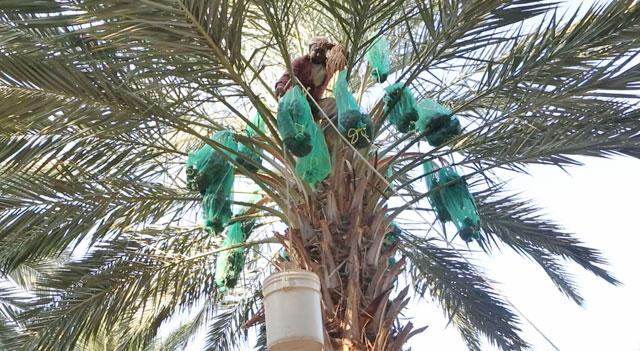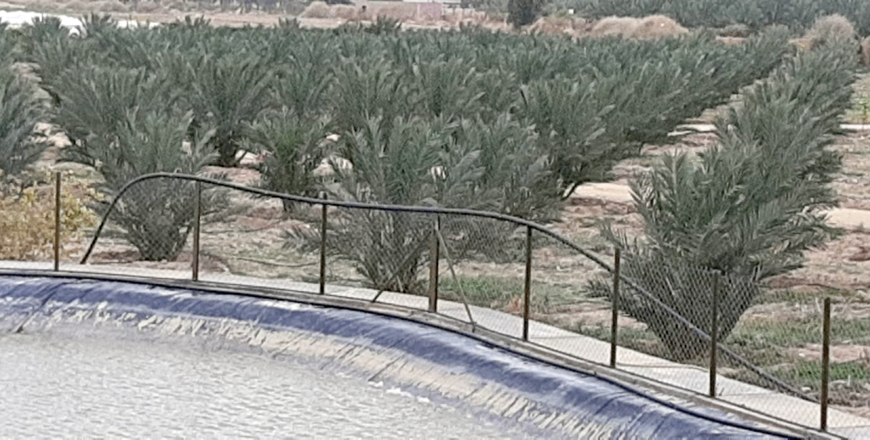You are here
Kingdom’s date sector on track for promising bumper harvest
By Mays Ibrahim Mustafa - Apr 26,2022 - Last updated at Apr 30,2022

Date palms constitute 20 per cent of cultivated areas in Jordan with roughly 650,000 palm trees cultivated on around 45,000 dunums, according to the Jordan Dates Association (File photo)
AMMAN — The date palm sector in Jordan is showing promise, marking a notable increase in production and exports, according to experts.
In 2021, production increased by 10 per cent, reaching 30,000 tonnes, up from 2019 production, which was between 26,000 to 27,000 tonnes, President of the Jordan Dates Association (JODA) Anwar Haddad told The Jordan Times in a recent interview.
“Thirty per cent of production is exported to over 15 countries, including the UAE, Qatar, Kuwait, Morocco, Turkey, the UK and France,” he said, adding that yearly sales in the Jordanian date sector amount to roughly $140 million.
Haddad noted that demand for Jordanian dates has notably increased in the past few years for a number of reasons, including “the reputation they have gained for their premium quality”.
“The average per capita consumption rate in the years 2017 to 2019 was 1.5 to 2 kilos, while it currently stands at 3.3 kilos. Exports have also witnessed a rise from 7,000 tonnes in 2019 to 9,000 tonnes in 2021,” he said.
Over the past two years, the JODA has focused on promotional activities through local and international exhibitions, social media campaigns, and festivals, particularly the Jordanian Dates Festival, organised in cooperation with the Ministry of Agriculture and the Khalifa International Award for Date Palm and Agricultural Innovation (KIAAI), added Haddad.
“The Jordanian Dates Festival, which is held yearly in October, has helped attract buyers to Jordanian dates from all over the world and resulted in a number of profitable contracts,” Assistant Secretary General of the Ministry of Agriculture for Marketing and Quality Hazem Samadi told The Jordan Times.
Date palms constitute 20 per cent of cultivated areas in Jordan with roughly 650,000 palm trees cultivated on around 45,000 dunums, according to Haddad.
He pointed out that Jordan’s date palm sector serves as a “lever” for the agricultural sector, which makes up 5.4 per cent of the Kingdom’s gross domestic product (GDP).
Investments in the industry amount to $500 million and provide roughly 5,000 to 8,000 job opportunities, around 40 per cent of which are for women, he said.
Climate ‘best in the world’ for cultivation
Currently, date palms are cultivated in the Jordan Valley, Azraq, Wadi Araba, Aqaba, Southern Shouna, and Karama. The main two varieties of palm trees cultivated in Jordan are Barhi and Medjool, according to Samadi, who noted that the number of Medjool palms in Jordan is over 400,000.
Local farmers interviewed by the Jordan Times noted that Jordan’s climate is among the contributing factors to the quality of Jordanian dates and their “distinction”.
“The area near the Jordan River, particularly the Jordan Valley, is among the best in the world for date palm cultivation due to its location below sea level and the convergence of its day and night temperatures,” said Faisal Abu Jeriban, an agricultural engineer who works in the Jordan Valley.
“This means that while the temperature is high in the morning, it isn’t accompanied by a sharp decrease at night,” he added, noting that date palms have specific heat requirements.
Abu Jeriban also described dates as a “strategic” crop known for their efficient water use, high nutritional value, and lengthy shelf life.
“One thing that distinguishes this crop is that it can be stored for a whole year, while maintaining its quality. Date palms can also adapt to extreme drought, heat and relatively high levels of soil and water salinity,” he said.
Demand rises with scarcity of skilled labour
Main challenges faced by the industry include the scarcity of skilled labour, according to Abu Jeriban.
“Cultivating date palms requires trained technical labour and experienced hands” willing to work in extremely high temperatures that can reach up to 40°C to 50°C in the summer,” he said.
Mu’taz Abu Alnaja, an agricultural engineer working in Karama, added that “the continually rising prices of fertilisers and pesticides without a clear cause is an issue facing farmers in all agricultural sectors, and it calls for increased supervision of traders of agricultural substances”.
He also pointed out that there is a rising demand for Jordanian dates, which local farms have the ability to meet it if provided with the proper guidance.
“Overall, we have workers with valuable expertise in the sector, but as date palm cultivation in Jordan is still somewhat new, most of our work as farmers is guided by personal challenges and experiences,” he told the Jordan Times.
“We need experts from the relevant official entities to guide local farmers in order to improve and increase production,” Alanja added.
According to Samadi, date palm cultivation in Jordan began 25 years ago, and while there is a marked yearly increase in the amount of date palm-cultivated areas, palms begin to bear fruit in four to five years and reach full bearing at 10 to 15 years.
High economic return
Samadi pointed out that in addition to the fact that date palms can be cultivated in saline environments and sandy soils “unfit for other crops”, they also record a high economic return per cubic metre of irrigation water used.
“Its high economic return in addition to its light weight allows us transport this crop in airplanes, reaching non-neighbouring countries,” said Samadi, noting that the rising global demand makes dates, particularly the Medjool variety, as Jordan’s most economically viable crop.
Jordanian dates is exported at JD10,000 per tonne, minimum, and one kilo of dates is locally sold for consumers at JD3 to JD10, “depending on quality”, he added.
In 2020, the Ministry of Agriculture, in cooperation with the KIAAI and JODA, launched the national strategy for developing palm cultivation in Jordan from 2020 to 2030.
“It aims to enhance the competitiveness of Jordanian dates in a manner that allows them to be an important source of food security and national income for the Kingdom by creating the enabling environment required to produce and export palm dates, enhancing human and institutional capacities, and promoting applied research,” Samadi said.
Upon implementing this plan, production is expected to reach 60,000 tonnes and the total volume of exports is to reach 30,000 tonnes by the year 2030. This predicts an increase in the value of exports, which is expected to reach 150 million, he added, noting that the sector will be able to provide around 15,000 job opportunities.
Related Articles
AMMAN – Deputising for His Majesty King Abdullah, Agriculture Minister Khalid Hneifat on Sunday inaugurated the third International Festival
AMMAN — Plans are under way to set up a company for marketing Jordan’s palm dates, a high-value crop whose cultivation is increasingly expan
AMMAN — The Kingdom’s production of palm dates is expected to reach 35,000 tonnes in 2023, according to President of the Jordan Dates



















